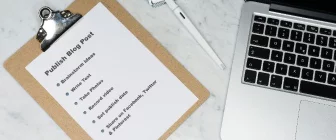
Authority is a big deal for SEO. In a list of Google ranking factors published by Backlinko, trustworthiness and authority play important roles.
Here are just some of the ranking factors listed that are related to or involve authority:
- A solid domain history
- Domain authority
- Content that covers the topic in-depth
- Recent content, especially for time-sensitive queries
- Correct grammar and spelling
- Number of — and quality — of outbound and inbound links
- References and sources
But how do you make your content authoritative? One way is to include information and quotes from — and links to — authority sources.
ALSO – Need to create authoritative content? Try our SEO content writing services.
What Are Authoritative Sources?
Authority sources are generally recognized as reliable because they demonstrate authority or are recognized by other experts in the industry as being so.

For example, if you’re writing about a medical topic, most people would accept that the Centers for Disease Control and Prevention or the World Health Organization were reliable sources. And if you’re writing a general-purpose article for consumers, sources such as WebMD might also be considered appropriate. A personal blog from someone with no discernible credentials — or even an unknown physician’s blog that gets no peer review — would likely not be considered authoritative in this case.
Need to create authoritative content? Hire the web’s best content writers today!
What you can consider authority depends in part on your audience, your topic and the level at which you’re writing. But the following table lays out some good general rules for a starting point.

Why Are Authoritative Sources Important?
- Authoritative sources help you create content that meets Google’s E-A-T guidelines.
- Authority content is important for SEO performance, which helps you drive more traffic to your pages.
- Trustworthy, expert content provides value for your reader, which can increase your conversion rates or keep people coming back to your site.
How to Find Authoritative Sources for Your Content
Finding authority sources can increase the amount of time it takes to create your content. But it doesn’t have to take forever or be an exercise in frustration. Here are nine tips for using authority sources to inform your content.
1. Don’t believe the repeat.
Daniel Ray, the editor-in-chief at LawnStarter.com, says, “I see young content writers make this mistake all the time. They believe if something has been repeated a few times on the web, it must be authoritative and can be repeated again.”
You can’t afford to rest on the content of others when trust is so important. Don’t assume something is correct — and therefore safe to repeat or link to — simply because you saw it repeated a number of times on social media or in unknown blog posts.
2. Do find the original source whenever possible.
“If you want quality, authoritative sources,” says Ray, “the best practice is to take the time to find the original source. Quote it and cite it directly rather than cite a second- or third-hand version. By going to the original source, you find the greatest amount of data as well as nuances lost in later pastiches.”
A pro tip is to follow the link trail to find out where information came from. If you find an article with a fact you want to use, click on the link the article uses to back up its claim. Sometimes, you have to click through a number of links — all on pages that have repeated the information from someone else — before you get to the original source.
Before you link, evaluate the original source. Is it a solid, expert source? And does the original source even say what the first article you found claimed? Consider the game of grapevine you might have played as a child: The message from the first person usually changes by the time the last person hears it. That can happen online too.
3. Don’t cite random blogs or Wikipedia, but do use them.
“Wikipedia is not reliable,” says Tim Grinsdale, owner of TOAD Diaries — “even if you see other sites referencing it.”

But Anh Trinh, managing editor of GeekWithLaptop, says that doesn’t mean you can’t use Wikipedia at all. Trinh also says you shouldn’t use Wikipedia as a source or link to it, but you can look at the source list on relevant Wikipedia articles. “You’ll often see books, websites and articles linked there that could be used as an authoritative source,” says Trinh.
4. Do conduct a targeted site: search.
Sorting through pages of Google results that relate to competitors or aren’t considered authority can be a real drag. Research fatigue can even lead you to take the first decent-looking source at face value without looking deeper.
Save yourself some major research woe by perfecting the site: search to find authority sources. These searches limit the types of pages Google returns.
Conduct a site: search by typing: search term site:limiting factor. Here are some examples:
- “blood pressure medication site:.gov” returns pages about blood pressure medication from .gov sites only
- “blood pressure medication site:cdc.gov” returns pages about blood pressure medication only from the United States’ Centers for Disease Control and Prevention site
- “nursing degree plans site:.edu” returns pages about the search term from .edu sites
- “patient infection statistics site:beckershospitalreview.com” returns pages only from the industry site Becker’s Hospital Review
Limiting your search to the type of site or to a known authority site can help you quickly find the information you need on a page you’re confident in sourcing.
5. Don’t rely solely on “experts” on Quora or Reddit
Grinsdale says one way to get authoritative information “is to do outreach to people within the niche/industry you’re preparing to write about.” Anh Trinh advises using questions and answers on sites like Quora. “Quora has tons of authoritative sources, since most of the people answering this have the credential to back it up,” he says.
Kenny Trihn, the editor of Netbooknews, seconds the recommendation. “I find Quora and Reddit helpful. They have many knowledgeable people with different kinds of expertise.” But Kenny Trihn says you do need to do the work to backup what you find out via these types of user-based resources. Conduct “personal research that backs up the information you get,” he says.

6. Do @ people on Twitter for comments.
R.J. Weiss, a Certified Financial Planner and founder of The Ways to Wealth, recommends turning to Twitter. “I’ve had success using Twitter to include authoritative sources in content. Specifically, using the @ feature on Twitter to ask them a question directly. The response rate is fairly high with this method.”
Weiss also notes that if you get a reply on Twitter, you can use it as a visual break in your own content. Collecting quotes via Twitter lets you embed images of the actual tweets for scannable content that appeals to many readers.

7. Don’t forget that authority sources can be outdated.
When doing web research, remember that timeliness and relevance are important. No matter how authority your source seems, if the information is from a decade ago and you’re writing in a fast-moving industry, you can probably do better.
Limit your searches to information published the past two years when possible. And if you find a report that has the exact type of information you want but it’s out of date, see if the publisher or agency has issued an updated version.
8. Do sign up for paid and free research tools.
Anh Trinh says, “Another thing is to look for free or paid peer-review publications. Examples of open access journal sites I use are MDPI and JournalFinder.”
Chloe Brittain seconds Trinh’s recommendation to use online research tools. She owns Opal Transcription Services, which works with numerous academic clients, and says, “Two of my favorite sources for research are Infoplease and The New York Times Newsroom Navigator.”
You can also search scholarly articles and journals via Google Scholar.
9. Don’t forget that SEO tools can give you some clues for sources with authority.
Malte Scholz, cofounder of Airfocus, says he uses SEO tools to find authority sources. “In other words, I pull up the first result in Google and use Ahrefs to find external links that the article is pointing to,” says Scholz. “That way, I can find 5-10 sources per single page, and within 30 minutes, I can have 50-100 sources for a topic that I want to research and write about.”
Best Practices for Including Quotes and Sources in Content
Obviously, you can’t copy and paste information from a source and call it a day. These tips help you cite sources without reducing the quality or originality of your own content.
Avoid Plagiarism by Citing Correctly
Never use someone else’s ideas or information without giving them credit. Here are some ways to do so online.
- Use an inline citation that credits the source for the information.
- According to the Centers for Disease Control and Prevention, more than 1.6 million Americans receive a cancer diagnosis annually.
- Use anchor text to lead back to the source, making it clear where you got the information.
- More than 1.6 million Americans receive a cancer diagnosis annually.
- Often, it’s even better to use both inline citation and anchor text.
- According to the Centers for Disease Control and Prevention, more than 1.6 million Americans receive a cancer diagnosis annually.
- Use footnotes or a source list at the bottom of the page to indicate all the sources you pulled information from.
Incorporating Quotes Into Your Content
Don’t just copy and paste enormous blocks of text into your content — even when you’ve sourced original quotes. Frame those quotes with your own content or thoughts to tell a unique story with backup from the experts. Think about how news articles are written — the high-quality ones don’t introduce a topic and then dump five paragraphs of a quote in to tell the story.
Tips for Making Quotes Easy to Read
When you do use quotes, use different formats and options to break up your text and make things easier to read. Use indents to offset slightly longer quotes, or break out important quotes into graphics. That makes them easier for people to share on social media and also draws attention to them.
Bonus Tip: Put Expert Writers to Work for You
Starting to feel like finding authority sources is a lot of work? You’re not completely wrong. Which is why you might want to hire expert freelance writers who know exactly where to find the facts to make your content sing. Check out our article writing and other services for more information.
